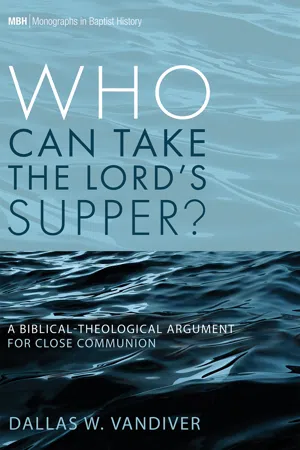![]()
Chapter 1
Historical Baptist Arguments for Who May Participate in the Lord’s Supper
In order to demonstrate the thesis of this book, it is important to understand its continuity or discontinuity with Baptists’ arguments about communion from previous generations. By surveying four answers to the question of who may participate in the Lord’s Supper, this chapter reveals that this book’s thesis is not an entirely new Baptist argument. However, the thesis does contain an emphasis not previously utilized to its full potential—a biblical-theological argument for close communion from a progressive covenantal perspective. Therefore, this chapter presents several Baptist arguments from influential debates on close communion.38 This section focuses on the biblical and theological argumentation over who may participate in the Lord’s Supper rather than highlighting the many appeals to historical precedent that appear in the literature.39
Arguments for Open Communion
Throughout the secondary literature on the early English Baptists, and specifically that on communion controversies, the figures surveyed in this section continually resurface.40 Henry Jessey (1601–1663)—one of the earliest English Baptists and third pastor of the Jacob-Lanthrop-Jessey church—appears to be the earliest Baptist proponent of open communion.41 His appeal to Romans 14 and 15—to urge fellow Baptists to receive those who were weak in the faith (lacking light in baptism) because Christ did not give a direct command prohibiting the unbaptized believer from communion—is picked up by every subsequent advocate of open communion. John Bunyan (1628–1688) and Robert Hall Jr. (1764–1831) are the ablest defenders of the open position. Bunyan’s arguments that visible sainthood is the ground of communion, that baptism is not a church ordinance or sign of entry into the church, and that the relationship between circumcision and Passover in the Old Testament encourages the practice of open communion each provide and informative background for this book. Robert Hall Jr.’s most notable arguments include (1) his claim that the pattern of the apostolic church should not be followed with respect to the ordinances because error was introduced subsequently and (2) his claim that the local church should have no additional constituting properties besides that which constitutes the universal church. Stanley Fowler presents the surprising argument that despite baptism’s sacramental function in the New Testament, local churches may decide to prioritize the unity of the universal church above the doctrine of baptism. While Charles Spurgeon (1834–1892) does not offer any unique theological argumentation for the open position, his practice demonstrates the open position taken to its logical conclusion. The open communion section ends with Daniel Turner’s (1710–1798) argument that free communion is grounded in the fact that Jewish and Gentile Christians did not establish separate churches based upon the Jewish Christians’ continued practice of circumcision.
Henry Jessey
In Storehouse of Provision (1650) Henry Jessey admits that his church’s practice of open communion was positive,42 “procuring more to favor this baptism, or not so bitterly to oppose it,” resulting in “much blessing the Lord, for this our course herein.”43 The arguments and objections outlined here are selected from the thirty-three Jessey covers to provide the clearest sense of Jessey’s position and highlight the arguments most related to the thesis of this book.
Jessey presents several “grounds of admission” to the Lord’s Supper. First, he provides his methodological privileging of Scripture in the statement, “We must limit what the Lord limits and not limit what he does not limit.”44 Although the Lord limited participation in Passover to the circumcised and the believers in the New Testament were normally baptized prior to receiving communion, the New Testament does not limit the Lord’s Supper to the baptized. Therefore, Christians have no authority to deprive other disciples of the Lord’s Supper when they conscientiously object to baptism.45 Rather, because “the Lord puts no difference between [Christians] in point of communion; neither should we.”46 Christians are responsible then to receive all those he has received “though they be so weak, as that they hold up such things to be God’s ordinances” (Rom 14:1).47 Or, to state the matter another way, “There is neither precept, pattern, nor sufficient evidence from the New Testament to reject any professed believer, that walks righteously, soberly, and godly, according to his light, from communion.”48 Without further scriptural requirements for participation in the Lord’s Supper being stated in the New Testament, Jessey believes that open position provides a context for obeying all that Scripture expressly requires.
Later, Jessey grounds open communion in the nature of ...
